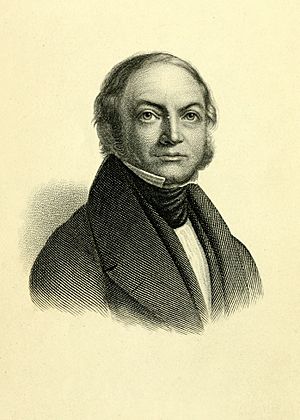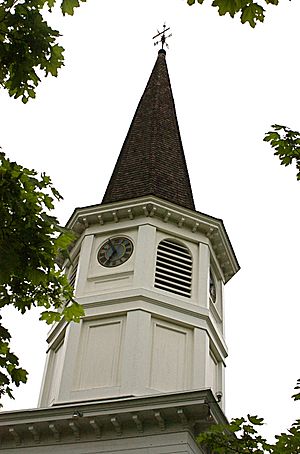Charles Follen facts for kids
Charles Theodor Christian Friedrich Follen (born September 6, 1796 – died January 13, 1840) was a German poet and patriot. He later moved to the United States. There, he became the first professor of German at Harvard University. He was also a Unitarian minister and a strong supporter of ending slavery, known as an abolitionist. Harvard University actually fired him because of his anti-slavery views.
Contents
Charles Follen's Early Life in Europe
Charles Follen was born in a place called Romrod, in what is now Germany. His father was a lawyer and a judge. Charles had two brothers, August Ludwig and Paul Follen.
He went to school in Giessen and was very good at languages like Greek, Latin, and French. When he was 17, he started studying theology at the University of Giessen. In 1814, he and his brother August Ludwig joined the army to fight in the Napoleonic Wars. But Charles got very sick with typhus fever and had to leave the army.
After getting better, he studied law and earned a doctorate in 1818. He then taught law at the University of Giessen. As a student, Follen joined a group called the Giessen Burschenschaft. This group wanted to see Germany become a republic, which means a country governed by elected officials, not a king. He also helped organize the first Wartburg festival in 1817.
In 1818, Follen helped many communities in Germany. He wrote a petition against a government rule that threatened their independence. This petition was widely shared and made the public very angry. Because of this, the government had to cancel the rule. However, this made powerful people angry at Follen, so he could not stay in his hometown. He moved to the University of Jena to teach.
At Jena, Follen wrote political essays and patriotic songs. His writings supported fighting for freedom. Because of his ideas and his friendship with Karl Ludwig Sand, he was suspected of being involved in Sand's assassination of a diplomat in 1819. Follen was arrested but found innocent because there was no proof. After losing his job at the university, he moved to Paris, France.
In Paris, he met important people like Marquis de Lafayette. But Follen was suspected again after another political assassination in 1820. So, he had to leave France and went to Switzerland.
In Switzerland, he taught Latin and history. His ideas, which were similar to Unitarian beliefs, upset some religious leaders. So, he left that job and became a law professor at the University of Basel. The German government kept demanding that Switzerland hand him over as a revolutionary. Switzerland refused twice, but after a third, more serious demand, they agreed to arrest him. In 1824, Follen and a friend named Karl Beck left Switzerland and sailed to the United States.
Charles Follen's Life in the United States
When Charles Follen arrived in New York City in 1824, he changed his name to "Charles" to sound more American. Marquis de Lafayette, who was visiting the U.S. at the time, helped Follen and Beck. He introduced them to important people in America.
With this help, Follen and Beck settled in Massachusetts. Beck quickly found a job at a school. Follen continued to study English and law. In November 1825, Harvard University offered him a job teaching German. In 1828, he also taught ethics and church history at Harvard's Divinity School. By 1830, he became a professor of German literature at Harvard. He became friends with a group called the New England Transcendentalists, and he helped them learn about German ideas. In 1828, he married Eliza Lee Cabot, who came from a well-known family in Boston.
Charles Follen also helped bring the sport of gymnastics to the United States. In 1826, he opened the first gym in Boston. He also helped set up the first college gym in the U.S. at Harvard that same year.
The Follens had a house built in Cambridge, Massachusetts. Their family Christmas tree was noticed by a famous English writer, Harriet Martineau. Some people believe the Follens were among the first to bring the German tradition of decorated Christmas trees to the United States. They certainly helped make the custom popular. His brother Paul Follen also moved to the United States in 1834, settling in Missouri.
In 1835, Charles Follen lost his job at Harvard. This happened because he spoke out strongly against slavery. He was a close friend of William Lloyd Garrison, another famous abolitionist. At first, many people, even in areas that later supported ending slavery, did not like Follen's strong views. Because of this, the study of German language in New England almost stopped completely.
Follen became a Unitarian minister in 1836. He was asked to lead a church in Lexington, Massachusetts. However, the church could not pay him enough to support his family. So, he took other jobs. In 1838, Follen became a minister for a church in New York City. But he lost that job within a year because of his strong anti-slavery opinions. He thought about going back to Germany.
In 1839, he returned to the church in East Lexington, Massachusetts. He designed its unique eight-sided building. The groundbreaking for the church was on July 4, 1839. Follen's octagonal church building is still standing today. It is the oldest church building in Lexington. When they started building, Follen prayed for his church:
[May] this church never be made bad by not accepting others, or by being narrow-minded, or by favoring one group; especially its doors might never be closed against anyone who would speak in it for people who are treated unfairly; inside its walls all unfair and cruel differences might end, and [there] all people might meet as brothers.
Follen was on a lecture tour in New York. He decided to take the Steamship Lexington to Boston for the dedication of his new church. Sadly, Follen died on the way. His steamer caught fire and sank in a storm in the Long Island Sound. Because of Follen's strong anti-slavery beliefs, his friends could not find any church in Boston willing to hold a memorial service for him. Finally, in March 1840, a memorial service was held for Follen in a hall in Boston.
Charles Follen's Writings
- Psychology (1836)
- Essay on Religion and the Church (1836)
In 1841, Follen's wife, Eliza Lee Cabot Follen, who was also a well-known writer, published a collection of his sermons, lectures, and a biography she wrote about him.
See also
 In Spanish: Charles Follen para niños
In Spanish: Charles Follen para niños
 | Leon Lynch |
 | Milton P. Webster |
 | Ferdinand Smith |



